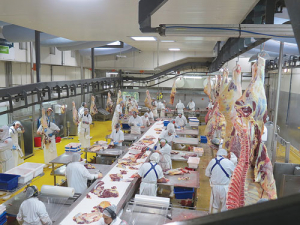Move over ham, here comes lamb
It’s official, lamb will take centre stage on Kiwi Christmas tables this year.
 The red meat sector has been urged not to reinvent the wheel in regards to coming up with organic standards for the industry.
The red meat sector has been urged not to reinvent the wheel in regards to coming up with organic standards for the industry.
Primary sectors need not create new standards for animal welfare, grass-fed, GMO and biodiversity because these are already part of existing organic standards, says Brendan Hoare.
The former chief executive of Organics Aotearoa NZ (OANZ) says a real task, and one that should be done for the best of New Zealand, is to ‘unpack’ the organic standards which have all these components and are internationally recognised.
“New Zealand does not need is a proliferation of standards and confusion in field (farmer) and market (customer). Clearly pathways to best management practices that are aligned with market requirement are essential.”
Hoare moved on from his position as OANZ chief executive at the end of October, after a restructuring of that organisation, but he remains involved in the industry through his company Pure New Zealand.
He says while there are export markets for organic beef, lamb and wool, there is also a very strong domestic market.
“We always say we are not going to solve the red meat sectors’ issues. But we offer solutions for sure and can answer some of the questions they have, but the structural issues they need to organise.”
In its latest market report, Hoare says OANZ made sure they had the Federation of Maori Authorities, DairyNZ, BLNZ and Horticulture NZ and Wine NZ all doing research with them to find out more.
For sheep and beef, results were indicative – although not conclusive – of a trend. At least 50% of BLNZ members, who replied to the research BLNZ put out, wanted to know more about organics. “Farmers want change too. I come from a farming background, I live on a small farm and I am engaged daily,” says Hoare.
“The market wants change and farmers do too. Most farming communities I talk to realise things aren’t great. No one consciously, purposely likes to pollute or destroy the environment. There might be a few, but we have got to offer pathways for people to move. I think that is crucial.
“You can’t [sit] on your high horse and blame; that is not the culture you need. You must have an environment where people have avenues to move at a pace, time and framework which works for them and their families. It has to be sustainable economically over time.”
Farmer confidence has taken a slight dip according to the final Rabobank rural confidence survey for the year.
Former Agriculture Minister and Otaki farmer Nathan Guy has been appointed New Zealand’s Special Agricultural Trade Envoy (SATE).
Alliance Group has commissioned a new heat pump system at its Mataura processing plant in Southland.
Fonterra has slashed another 50c off its milk price forecast as global milk flows shows no sign of easing.
Meat processors are hopeful that the additional 15% tariff on lamb exports to the US will also come off.
Fears of a serious early drought in Hawke’s Bay have been allayed – for the moment at least.

OPINION: The release of the Natural Environment Bill and Planning Bill to replace the Resource Management Act is a red-letter day…
OPINION: Federated Farmers has launched a new campaign, swapping ‘The Twelve Days of Christmas’ for ‘The Twelve Pests of Christmas’ to…